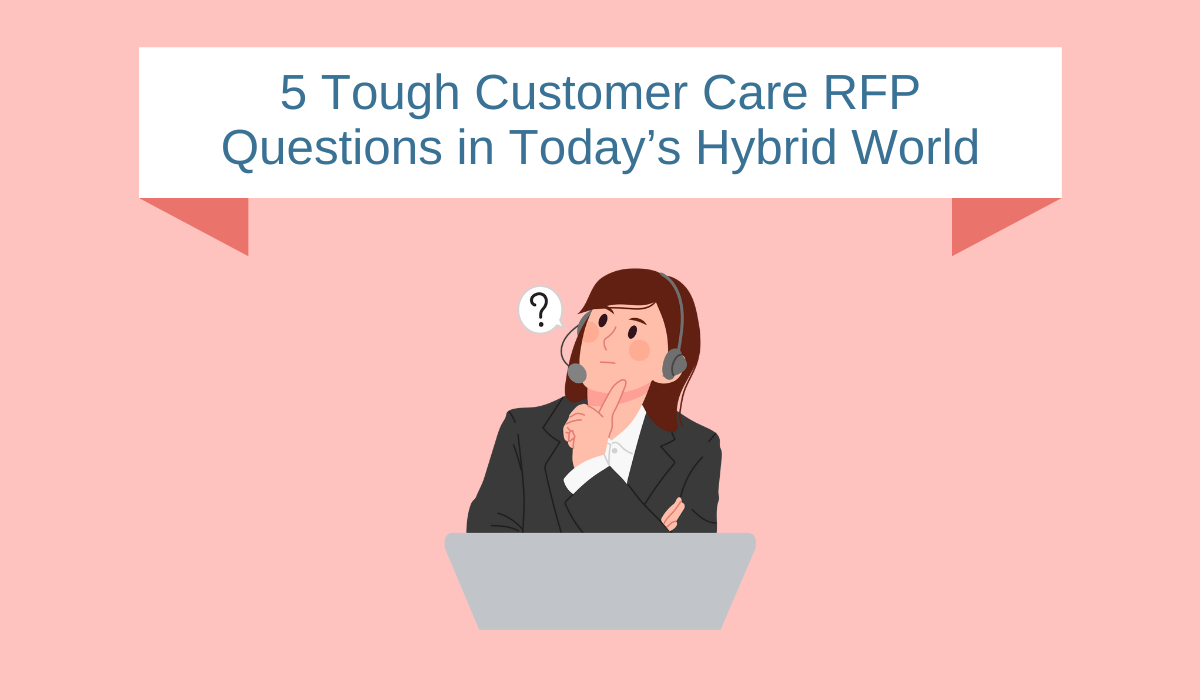5 Tough Customer Care RFP Questions in Today’s Hybrid World

Too tired to read? Listen to the audio via our podcast here:
We’ve said it before and we’re not afraid to repeat it until the cows come home: using a boilerplate RFP in the process to find a new customer care outsourcer is a quick road to failure. You’re looking for a strategic partner who will interface with your customers day in and day out. That requires a custom RFP. And in the wake of the pandemic, that RFP also needs to be tailored to address the ways in which our world, industry, and business has shifted. There’s no sugarcoating it. You need to ask the hard questions. Here are five of the toughest customer care RFP questions to make sure you’re asking in today’s hybrid world.
1. What gaps in your capabilities did the pandemic reveal and how did you resolve them?
It’s a vulnerable question—you’re asking them to reveal their weaknesses, which isn’t what a typical vendor wants to do when they’re trying to sell themselves. But no company is perfect, and the pandemic era especially opened people’s eyes to gaps they had overlooked in the past.
A potential partner should be frank about the things they could be doing better. You’re looking for a company that values continuous improvement and is transparent about any potential issues. Asking this question in your customer care RFP can help you gauge their approach to problem solving as well as their commitment to honesty and integrity.
Finally, it is important to recognize where your own gaps are as a company. Can a partner’s strengths offset your weaknesses, and vice versa? This is critical to know and understand before you make any final decisions.
2. How does your culture support agent retention?
The contact center world is riddled with stereotypes of soul-crushing jobs. Even for customer care providers that are actively trying to quell that image, the fact is retention is difficult and attrition rates run higher than many other industries. Throw the Great Resignation into the mix, and you’re potentially looking at a revolving door of agents.
Asking a potential vendor to get honest about this reality and describe how they approach this dilemma is critical. In addition to asking smart questions about attrition, be sure to dig into their employee engagement and retention initiatives. What does their internal communication look like? How do they convey employee appreciation? How do they follow up on employee feedback? Ask for specific details and examples of similar clients or projects so you can understand an apples-to-apples comparison.
Ultimately, you’re not asking for zero turnover. You’re looking for a partner who knows how to create a positive employee experience—after all, happy employees make for happy customers.
3. Describe your performance development process for remote or hybrid agents.
Contact center turnover often results from a lack of professional development. The best outsourcer understands how to combat this. However, coaching agents in the hybrid world looks vastly different than in-person. You need to know how well a potential partner has adjusted to this and whether they are able to maintain or exceed standards outside the four walls of their office.
The right partner will be able to articulate their governance structure for creating personalized improvement plans, holding coaches accountable, and measuring for success. Their structures and processes should be highly tailored to the remote environment, rather than just a direct reflection of their in-person efforts. How do they maintain a one-to-one relationship between coach and agent? What’s their correction path when things get off-course? What kind of agent feedback do they receive regarding performance development? Find a partner who can answer these questions with confidence and transparency.
4. What are you doing to promote diversity and inclusion within your organization?
It’s easy for any company to publish a DEI statement on their website… and then struggle to follow through within the walls of their organization. But you’re looking for integrity. You want to find a partner who values diversity and belonging and understands why these things are both important and beneficial. Finding a vendor who has successfully implemented DEI initiatives and continues to find ways to improve them everyday requires asking them the hard questions.
What are the tangible practices they employ? How do they measure success? What is the feedback they hear from their employees? How does this translate to the customers they serve and support? At the end of the day, you want a partner whose culture aligns with your own and who can reflect your brand to your diverse customer base.
5. How do your success ratios differ in a remote work environment versus in-person?
What metrics and KPIs are important to you as you measure the success of your customer care program? Is it as simple as AHT or FCR? Or is it more complex like NPS or customer churn? Whatever it is you’re looking for, you want to know that your contact center partner can deliver consistency—whether it’s in the office or in a remote work environment or some combination of both.
Asking how those ratios differ between workplaces will give you an inside look at how adaptable their processes, management, and coaching styles are to different environments. They should be deeply aware of their strengths and weaknesses in both scenarios, problem-solving as necessary. Once again, be sure you’re asking for examples within similar clients and projects so you can more accurately compare.




